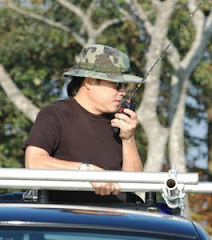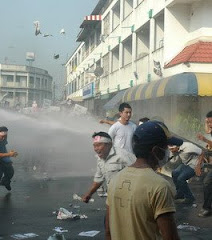
For Unilever, P&G, No Good Deed Is Going Unpunished
Damned if You Do: Cause Efforts Become Ammo for the Critics
By Jack Neff
Published: May 05, 2008 BATAVIA, Ohio (AdAge.com)
-- Greg Allgood, who directs Procter & Gamble Co.'s Children's Safe Drinking Water program, recently has spent a lot of time demonstrating Pur's purification packets for developing countries that turn disgusting, brown water crystal clear. On one TV appearance last week, he accidentally took a swig from the dirty "before" water instead of the treated water in a clip that made the rounds to "Countdown" on MSNBC.
Greenpeace: Ads posted in London parody Dove's 'Campaign for Real Beauty.' It's symbolic of the downside companies in the forefront of ethical marketing have faced in recent weeks: No good deed goes entirely unpunished; high-profile stances on social causes can have unintended consequences; and the water is getting pretty murky as "ethical marketing" encourages consumers and activists to delve into corporate policies in ever-greater detail. P&G and Unilever in particular have become lightning rods of late in part because of the public stances they've taken on environmental and social issues. "Most activists of whatever persuasion on whatever issue tend to believe that they get most traction (and news coverage) by aiming at the biggest name rather than the biggest challenge," said a Unilever spokeswoman in an e-mail. "In most instances, it seems that the biggest 'name' tends to be the one that has done the most to attack the ... problem." Irony of the good oilCase in point: Unilever has scored at the top of global ethical and sustainability indexes in the past year. Its reward was to be labeled by Greenpeace, along with its global Dove agency, Ogilvy & Mather, and some U.K. PR firms, as killers of Indonesian orangutans because it buys palm oil from former rain forests. The irony is that palm oil was supposed to be the benign alternative. P&G has been substituting it for oil derivatives in laundry detergents and touted a big contract for Indonesian palm oil in 2006. Unilever has also been using palm oil to replace widely reviled trans fats in margarine and other foods. Both companies, and many more, have been using it as a cheaper alternative to grain-based products as the U.S. government drives up grain prices and fuels global food shortages by subsidizing ethanol to replace oil. But it was Unilever that Greenpeace singled out for special attention, sending people in orangutan suits to scale the company's London headquarters last month and unleashing sophisticated parodies of Dove's "Campaign for Real Beauty" on the London Underground and YouTube. The guerrilla poster campaign plastered ads with orangutans over Dove's ads, and the YouTube entry, dubbed "Dove Onslaught[er]," rose to the top of results in searches for Dove at the site, racking up 250,000 views its first week. It appears to have been very effective. On May 1, Unilever CEO Patrick Cescau backed Greenpeace's call for a moratorium on deforestation in Indonesia by palm-oil producers and pledged to get the ingredient only from sustainable sources by 2015. 'Greenwash'Unilever wasn't singled out just because of its high-profile environmental and social stances, a Greenpeace spokesman said, claiming the company is the world's largest user of palm oil. The group had noted Unilever's high-profile stances on environmental issues, including chairing an industry committee on sustainable palm-oil production that hasn't done much since 2002. "So there was an element of greenwash there," he said. Greenpeace is considering ending its campaign against Unilever, but the spokesman said the group may turn next to P&G or Nestlé. The company accounts for about 4% of Indonesian palm oil production, in line with its global market share, the Unilever spokeswoman said. It is moving toward sustainable palm oil now because there's a new third-party certification program in place, she said. The company is building on more than a decade of similar sustainability moves regarding fish and tea. "These pressure groups realize companies are using [environmental and social stances] for marketing," said PR maven Howard Rubenstein. "So they're hitting them where their mouth is." One result, he said, is a confluence of marketing and politics that shows no signs of abating, with marketers tracking online buzz and other measures of public opinion as doggedly as politicians track polls. No turning backMr. Rubenstein said high-profile marketers are in the political arena to stay, whether they want to or not. Such decisions as P&G's to pull ads from MSNBC's Don Imus show last year after he hurled racial epithets at Rutgers women's basketball players is one he said had to be made. Such moves also have helped make P&G a darling of the Parents Television Council, which named it the most family-friendly advertiser in the U.S. last year for sponsoring so many shows the group likes and not sponsoring shows it hates. Right up until April, that is, when the PTC, as part of the Enough Is Enough coalition, singled out P&G for criticism among several major sponsors of hip-hop shows on MTV and BET laced with profanity, glorification of crime and drug use, portrayals of black men as criminals and black women as sex objects. In the ensuing blog chatter, some called P&G hypocritical for supporting such shows while also using a marketing program -- "My Black Is Beautiful" -- to bolster women's self-esteem. Take any P&G cause-marketing initiative, and you'll find some slice of consumers it provokes to criticize the company. Pur's effort has prompted detailed blog analyses of P&G's alleged negative impact on water quality -- from making tampons to bleaching paper. Even Pampers' program to vaccinate expectant mothers against tetanus in developing markets via UNICEF has raised calls for a boycott from some parents of autistic children who believe the vaccines could cause autism (the science behind that claim is the subject of considerable debate). "First and foremost, as a company, we are committed to doing what is right, not for goodwill but for the good we can do as an organization," a P&G spokeswoman said in an e-mail. On the media side, "We recognize consumer expectations for P&G to be a responsible advertiser are very high, and we take our responsibility as an advertiser very seriously," she said. "We do not proactively seek out opportunities to raise our profile on these matters. Our actions, or the actions taken by others, generate attention in the press, which raises our profile." It's impossible, she said, to know what net impact such controversies have on the business.
Credit Link: http://adage.com/article?article_id=126853



























































































































